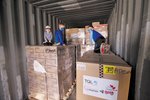By ARDEN BASTIA Since the COVID-19 lockdown in March, food insecurity throughout the state has risen, according to Paul Salera, director of Westbay Community Action, and Andrew Schiff, CEO of the Rhode Island Community Food Bank. Salera said, in an
This item is available in full to subscribers.
We have recently launched a new and improved website. To continue reading, you will need to either log into your subscriber account, or purchase a new subscription.
If you are a current print subscriber, you can set up a free website account by clicking here.
Otherwise, click here to view your options for subscribing.
Please log in to continue |
|





Since the COVID-19 lockdown in March, food insecurity throughout the state has risen, according to Paul Salera, director of Westbay Community Action, and Andrew Schiff, CEO of the Rhode Island Community Food Bank.
Salera said, in an interview, he has seen the need grow exponentially. “It depends on what the need is, but our food pantry is serving three to four times the amount of people in the past few months compared to pre-COVID.”
Salera said between April 1 and the end of October, Westbay distributed food to 18,000 individuals, completed 1,500 home deliveries for the elderly, disabled, or homebound, and did 7,500 curbside pickups, averaging 120 cars per day.
“We’re getting requests from people who have never used our services before,” he said. Hospitality workers, restaurant workers, and those who work in small businesses are among those requesting assistance. Salera projects that “this trend will continue well after the pandemic, because we don’t know how long those industries will be impacted.”
Westbay also provides rent and utility assistance, another area in which he has seen increased demand during the pandemic. “People are worried about what will happen, so they want to be proactive,” said Salera. He is particularly concerned about what will happen when the eviction moratorium ends. “Right now we’re getting 15 to 20 applications per week, which is almost tenfold what we received previously.”
Salera noted the rise in utility assistance requests, saying that it makes sense. “People are home now 24/7. The water bills are about two to three times what they used to be.” The moratorium on utility shut-offs extends through May 2021, but come that time, “all these people will have thousands of dollars in a balance, so we put money aside for when that comes up,” Salera said. He added that he’s witnessed a growing need for mental health assistance and seen an increase in substance abuse assistance over the course of the past few months.
Westbay Community Action isn’t alone with these growing numbers. On Nov. 23, the Rhode Island Community Food Bank published a 2020 status report on hunger, detailing a growing community need. Since the beginning of the pandemic in March, one in four households in Rhode Island lacks adequate food. Demand for food assistance from the Food Bank grew by 26 percent, and underlying medical conditions that increase the risk of severe illness from COVID-19 are prevalent among food-insecure Rhode Islanders.
Prior to the pandemic, food insecurity was on the decline, according to the report, falling from 14.7 percent in 2010 to 9.1 percent in 2019.
The status report also detailed that the current health emergency is deepening long-standing racial and ethnic disparities. Black and Latinx Rhode Islanders are experiencing higher levels of food insecurity, while also being over represented among COVID cases and hospitalizations. Where 21 percent of white households lack adequate food, 36 percent of Black households and 40 percent of Latinx households are food insecure.
Another staggering statistic was the increase in hotline calls for food assistance. The United Way of Rhode Island’s 2-1-1 hotline received nearly 60,000 calls for food assistance between March and August, with over 16,000 calls in April alone. The number of calls grew by 77 percent, as compared to the same period in 2019.
To meet the need, the RI Food Bank increased its food distribution by 1.6 million pounds. Rhode Island was also the beneficiary of a new federal program, Farmers Feeding Families, which was established by the USDA in April. The program granted $3 billion to farmers across the country, including local growers Farm Fresh RI, to provide boxes of fresh produce, meat, and dairy items to people in need. The Food Bank received 33,000 of these boxes, however, the program is expected to run out of funding at the end of this year.
Because of the closing of schools, over one-third of low-income parents reported that their children were not eating enough. During a traditional school day in Rhode Island, pre-pandemic, 52,000 children receive free or reduced-price lunch and 28,000 received free breakfast. As an alternative, schools began offering free meals, grab-and-go style, but participation was relatively low, according to the Child Nutrition Programs Report from the RI Department of Education. Schools distributed 2.3 millions meals between March and June, less than half of the free and reduced-price meals served to students when schools are open.
In a press conference on Nov. 23, Schiff spoke to the action steps the Food Bank is taking. Working alongside Sen. Jack Reed, the Food Bank is urging Congress to pass another COVID-19 relief bill, petitioning the USDA to provide pandemic EBT to all children from low-income families, advocating for the Department of Human Services to implement a SNAP outreach program to help newly unemployed Rhode Islanders, and contacting legislators in support of the governor’s call for increase funding for the food bank.
But despite the mounting need, both Salera and Schiff agree on the outpouring of support from the community.
“The community has been phenomenal,” said Salera, who had to purchase a 26-foot refrigerator box truck to store perishable food. “We’re working with food pantries in the state to deliver our abundance. Dave’s Fresh Marketplace, Toyota, all these businesses are reaching out to us to give donations.”
Schiff noted the creative solutions many have come up with to “overcome the logistic challenges,” like the Lakewood Baptist Church that held a contact less, drive-through drive recently. “People have been really generous with their dollars, in part because folks haven’t been able to donate food, so they donate funds. We’ve seen people who are longtime donors double their donations this year. And we’ve seen over 4,000 new donors to the food bank.”
If in need of food, rental assistance, or other services, call the United Way’s hotline at 2-1-1. To donate to Westbay Community Action or the Rhode Island Community Food Bank, visit rifoodbank.org or westbaycap.org.
Comments
No comments on this item Please log in to comment by clicking here